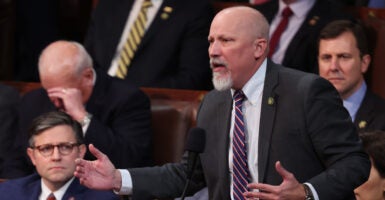The Republican rebellion over a new House speaker was a good thing, and it looks like it’s already paying off.
In early January, a group of 20 conservative House members held up the election of Rep. Kevin McCarthy, R-Calif., as speaker of the House, citing several fundamental concerns about how the legislative body functions.
These conservatives were able to extract several concessions from Republican leadership, including new rules that would allow for a longer review period before a scheduled vote, tighter controls on future taxes and spending, and an easier path to deposing a House speaker.
One of the changes that’s had an immediate impact is the inclusion of more members of the House Freedom Caucus, made up of some of the chamber’s most conservative lawmakers, on the House Rules Committee. This led to additional changes in how the House functions.
Under the so-called modified open rule, lawmakers were able to submit amendments to legislation pertaining to President Joe Biden’s withdrawal of oil from the Strategic Petroleum Reserve when the bill was debated on the House floor.
It’s the first time such a rule has been in place since 2016. The change effectively gives more power to rank-and-file House members who don’t merely have to accept what comes out of the chamber’s committees.
In a sense, the change further “democratizes” the House. I’d say in this case that’s a good thing.
“Democracy” is hardly an unqualified good—though the Left often just uses the word for “things I like.”
The Founders had a healthy skepticism of pure democracy, which often leads to anarchy and tyranny. However, they also generally believed that democracy, properly understood, had an important place in our federal republic. That place—at least at the national level—was in the House of Representatives.
The Framers of the Constitution created the House as a body most closely tied to the direct interests of the people, the most responsive to the attitudes of Americans acting in their separate polities. Yes, the people can be fickle. However, that’s why the Framers created a system of checks and balances in our government and would have been appalled by a mass plebiscite deciding issues.
Right now, our system is out of whack, to put it mildly. We have an executive branch that acts as a legislative branch, where even the president often is reduced to a figurehead of the vast, bureaucratic apparatus. Self-government is being replaced by the politics of the national, executive mandate. Bureaucratic Caesarism has pushed aside republican self-government.
Congress has ceded its real power. It’s been reduced to a rump institution, rubber-stamping 10,000-page bills—mostly written behind closed doors by lobbyists—with little genuine debate or larger oversight. Bringing back public debate of legislation could be a small first step toward restoring Congress to its rightful role in our governing system.
This is a good thing, even if it means that more far-left proposals make their way into legislation.
Willmoore Kendall, one of the most important conservative thinkers of the mid-20th century, warned that our system was becoming one in which electoral mandate rather than congressional deliberation was taking over and destroying our republican institutions.
In a review of the re-release of Kendall’s 1963 book, “The Conservative Affirmation,” Heritage Foundation scholar Richard M. Reinsch explained how this move away from legislative deliberation reengineered the way Americans think about government:
The democratic will to power has now become so embedded in our thinking about government that many Americans are unaware of why delay, deliberation, and filtration of voting are positive methods for insuring the republican principle best serves our common good.
It’s more than optimistic to think we can maintain anything resembling a free society if this continues.
If we want to keep our republic, Congress needs to reassert itself. Many were saying during the 15 ballots it took for McCarthy to win the speakership that the “chaos” was “embarrassing” the nation and harming our government’s credibility.
I’d say just the opposite. What’s destroyed the credibility of our government is Congress’ lethargy, its hollowness.
Restoring the vigorous and deliberative function of our elected representatives is an important step to righting our ship of state.
Have an opinion about this article? To sound off, please email [email protected] and we’ll consider publishing your edited remarks in our regular “We Hear You” feature. Remember to include the URL or headline of the article plus your name and town and/or state.
































